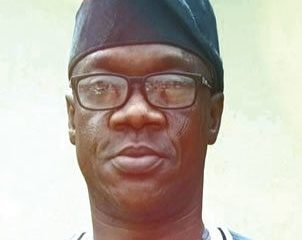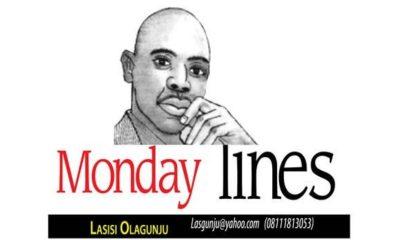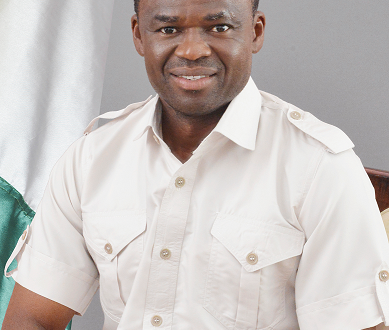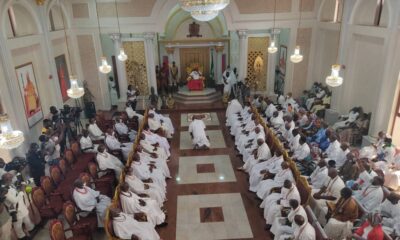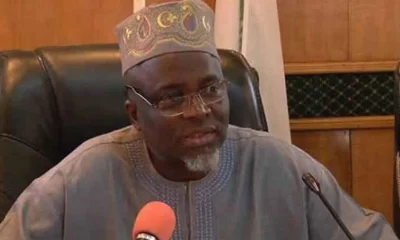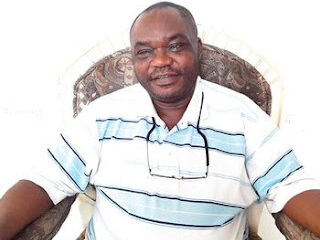Opinion
Peter Obi: Time To Destroy This Temple [OPINION]
Published
1 year agoon
By
Editor
By Lasisi Olagunju
There is a trending video of a senile Paul Biya, President of Cameroon, at the just concluded US-Africa Leaders Summit in Washington, DC. He is called to deliver his speech after President Paul Kagame of Rwanda. He comes out, sits down and starts browsing aimlessly through a pamphlet he is holding. He mutters some words to no one in particular. Then he gets up….People who understand the French spoken in the video say the man acted and said things which showed that he was not aware of where he was and why he was there. Eighty-nine-year-old Biya marked 40 years in power last month. He became president of the Republic of Cameroon on November 6, 1982 and has seen the country and its fortune melt progressively like wax set on fire. The man is the country; his son is positioned to be the future. More than 90 percent of Cameroon’s almost 25 million people have known no other president in their entire lives apart from Biya. They call him ‘father.’ You are likely to say Nigeria can never have a Biya who would sit tight here for 40 years. You may be right – and you will be wrong at the same time. Look at those very old men seeking to be our president in 2023. None of them will win and spend forty years on the throne – merciful nature will take care of that for us. But imagine one of the old men, if he wins, and he wills it, subsequently deciding to buy the throne for his thirty-something-year-old son. We will gladly sell out to him because we are always willing to sell. And, if the son is smarter than the dad, he will be there and get our lawmakers to amend the constitution, and buy power from us for himself and his descendants forever. We have enough foolishness, and madness, and the potential – and the structure- to make that happen.
There will be a Biya in Nigeria unless we demolish and reconstruct Nigeria’s house of abuse. Nigeria’s Labour Party’s presidential candidate, Peter Obi, said that much in Akwa Ibom last week: “The structure they have today is what we want to dismantle. It is a structure of criminality,” he lashed out at the establishment people who have forever held the knife and the yam of Nigeria. The big men, especially Obi’s opponents, taunt him repeatedly that he ‘lacks structure’ to translate his mass appeal and mass following to electoral success in the coming poll. And for them, he had bad news. He said the structure his opponents gloated about “is the structure that produced 133 million people living in poverty, 20 million out-of-school children, and made Nigeria surpass India in infant mortality. It is the structure that destroys us; we want to destroy that structure.” He spoke well, very well – the best words he has uttered since the beginning of this contest. There is no doubt about it that the killer-structure deserves to go if we must save ourselves and the country.
READ ALSO: OPINION: They Have Killed Her!
Ask computer engineers what to do to fix a bad system. They will tell you that the first fix is to restart your computer. Sometimes restarting demands force. “If it isn’t responding, and you can’t turn it off, then on, try forcing it to restart.” That is the advice from the makers of iPhones. They say so because they are wise. The sensible thing to do when a country is failing, or has failed, is to rework the structure, the parts, including the expansion joints. The pernicious Nigerian structure, if it survives the 2023 elections, will produce more than what Obi said. It will produce leaders worse than Biya – he has a senior, Teodoro Obiang Nguema Mbasogo, the president of Equatorial Guinea; that one has been in power since 1979. How long should an era last? His son is also the heir there. We do not yet have a Biya or an Mbasogo family gnawing at our guts but we have a ruling caste feasting on the heart of the system. They’ve narrowed the route to survival and they man the gates. And it will get worse. So, how do we escape that which is coming? Obi B. Egbuna was a Nigerian novelist, short story writer and playwright. He once wrote that “one way to destroy a people is to allow only the fools to survive.” And who is a fool? Plato has a definition: the one who revels in malicious pleasure. Plato’s teacher, Socrates held that mankind is made up of two kinds of people: wise people who know they’re fools, and fools who think they are wise – we have them as leaders and followers; both have a role to play in the coming contest for the soul of Nigeria.
One of Obi Egbuna’s most popular works is ‘Destroy this Temple’, a book about defiance and decisiveness against decay. I believe he took that book title from the Bible where Jesus Christ saw an abuse of structure and moved against it. Yesterday was Christmas, the festival of celebrations of Jesus’s birth. How many of those who sang and danced in celebration yesterday live their lives like Christ who left here over 2,000 years ago? He was calm and gentle but there was a lone incident where he lost his cool and went physical against abusers of privileges. The Bible has that instructive story that fits this narrative about breaking down and rebuilding a bad system. Men of advantage had ‘abducted’ the space of the Temple in Jerusalem and turned it into “a den of thieves” and “a house of trade” – a structure for sleaze and greed and hightailed loots of the ruling class. Jesus saw it but didn’t just whine and leave. With whip, he expelled the merchants and the money changers. “And Jesus entered the temple and drove out all those who were buying and selling in the temple, and overturned the tables of the money changers and the seats of those who were selling doves” (Mathew 21:12). Bible scholars call this story the cleansing of the Temple narrative. We need a reenactment of this rite in Nigeria. The Nigerian nation is like that Biblical Temple; it has become a haven for bandits and a place of refuge for ‘money changers’ to hold court.
The lesson from the temple story here is that there is no system that cannot be corrupted if the people it serves go to sleep. At the core of that temple incident was money and its corruptive influences. In ‘The Challenge and Spirituality of Catholic Social Teaching’, Marvin L. Mich Krier quotes William Herzog, author of ‘Parables as Subversive Speech’ as arguing that “the Temple cleansing cannot be divorced from the role of the Temple as a bank.” Criminals used “the temple’s outer court to change impure foreign money to temple coins for purchasing sacrificial animals” (Jack Hartjes, 2022). Krier proceeds to further give a scholarly insight into the political economic significance of the Jewish Temple: “In the time of Jesus, the Temple amassed great wealth because of the half-shekel temple tax assessed on each male. Historical evidence supports the fact that large amounts of money were stored in the temple. The temple then was able to make loans on behalf of the wealthy elite to the poor. If the poor were not able to pay their loans, they would lose their land. ‘The temple was, therefore, at the very heart of the system of economic exploitation made possible by monetizing the economy and the concentration of wealth made possible by investing the temple and its leaders with the powers and rewards of a collaborating aristocracy.’ As evidence of this role of temple funds, Herzog notes, ‘it was no accident that one of the first acts of the First Jewish Revolt in 66 C.E. was the burning of debt records in the archives in Jerusalem’ “ (Marvin Krier: 2011).
READ ALSO: OPINION: Charity Begins At Chatham
Just like the Temple in Jerusalem, Nigeria, built with the sweat and blood of all, has become some people’s business empire. It has become a country of public debts for all and private wealth for a select few. The year 2023 is one of decision and desperation. And it is just one blurry week away. We have old presidential candidates, fading and very desperate – because it is their last battle. We have third-force candidates backed by a very desperate youth population, and hordes of the angry poor who talk about taking back their lives from a plundering political elite. What is going to happen? When I heard one of them, Peter Obi, speak in Akwa Ibom with a promise to destroy the structure that has made a fool of honesty in Nigeria, I asked how he was going to do it. Peter Obi told the Nigerian youths: “...you are the next structure. We want to build a better place for our children.” The man obviously has a heart of gold but that is where it ends. Even if he wins, his win will reinforce the pillars of the structure he spoke of destroying. He will be sucked in and initiated fully into the sacred grove of the principalities. So, I think the ultimate solution is the destruction of Nigeria’s faithless temple – using the law. Nigeria is too defective to work. We must employ the law to destroy the temple and create our own “three days” to rebuild it. We need a new temple of justice and fairness to live normal lives. There are, of course, consequences; every act of cleansing has. Those who inherited the odious structure of Nigeria have a duty to keep it for their descendants even if the country’s 200 million people have to go down in the process. The noose is tightening as the darkness lengthens. The options are not pleasant and are not many. Protests and protestations will amount to nothing in the new year. One of the big presidential candidates told us last week. But good people everywhere must not keep quiet – and must resist being silenced by those who think they alone have a voice. At the same time, we should know that he who chooses to pray for the street madman must not close his eyes. And if you are moving against insanity, your footfall must wear shoes of silence at all times. The world has always been a dangerous place to practise iconoclasm. David Landry, a professor in Theology at the University of St. Thomas, United States, is quoted variously by other scholars as pointing out to us that “within a week” of Jesus fighting the principalities in the Temple, he was dead. Landry cites the disciples, Matthew, Mark, and Luke as agreeing that the Temple cleansing event “functioned as the ‘trigger’ for Jesus’s death.” Krier also tells of these consequences. He points at the book of Mark where Jesus accused the merchants of making the Temple a den of robbers: “And when the chief priests and the scribes heard it, they kept looking for a way to kill him.” Nigeria will not kill us.
Merry Christmas and a Happy 2023.
You may like
News
OPINION: National Amnesia Whitewashes The White Lion
Published
22 hours agoon
May 3, 2024By
Editor
Tunde Odesola
Sleep is the next-door neighbour to good memory. This is the view of neurologist Andrew Budson and neuroscientist Elizabeth Kensinger in their book, “Why We Forget and How to Remember Better: The Science Behind Memory,” published in 2023 by Oxford University Press.
It’s my considered view that lack of sleep can twist the head backwards, like Humpty Dumpty-headed Nigerian leaders, who amass fleeting riches, little realising that life is a transient journey exemplified by the birth of Solomon Grundy on Monday, christening on Tuesday, marriage on Wednesday, sickness on Thursday, worsened on Friday, death on Saturday, and burial on Sunday.
Macbeth murdered sleep and he slept no more; Nigerian leaders murder sleep, yet they snore even more because hell lives here.
Both Budson and Kensinger believe that memory isn’t a bank that just sits somewhere in the brain. They aver memory is an active and effortful process. Using FOUR as a mnemonic for things to do to get information encrusted into memory, both researchers opined that the mind must (F)ocus attention, (O)rganise the information, (U)nderstand the information and (R)elate the information to something the brain already knows.
According to the authors, when someone goes to a party and can’t remember anybody they met or when a student studies for an exam and can’t recollect the content they know, such an individual cannot focus attention. When struggling to retrieve information from memory, the scholars advise the individual to avoid the urge to generate possible answers, saying in those trying moments, the individual should use retrieval cues such as remembering events at the party or what he read the last time he studied for the exam, ‘the context, and the possible connections’.
To store up information in memory for longer-term access, getting enough sleep is one of the most important things to do, counsel Budson and Kensinger, adding that, “Sleep helps information to move from being briefly accessible to being stored in long-term ways.” Eating right, engaging in regular exercise, keeping a healthy body weight and being socially active are other ways of keeping the brain healthy, says the researchers.
FROM THE AUTHOR: Bello And Enenche: A Tale Of Two Lions [OPINION]
Budson, a Professor at Harvard Medical School, contends, “There’s nothing wrong with outsourcing your memory or using memory aids. I offload my memory as much as possible. I have all my passwords written down in a secure digital place. I use calendars, planners, and lists.”
Kensinger has a piece of advice for the student studying for an examination: Do not cram! She explains that the need for sleep and the time it takes to reach understanding make it important for students to start their preparation early and keep it going throughout the semester rather than cramming right before a big test.
Chair of Psychology and Neuroscience, Boston College, Professor Kensinger says when the individual is aging, and not struck with Alzheimer’s disease or age-related diseases or disorders, the brain prioritises the gist of events by embracing the similarities across events rather than trying to hold on to each individualised event.
In an article, “Why We Have to Forget to Remember,” written in The Sunday Magazine, a psychologist, Oliver Hardt, says: “If we lost the ability to forget, we might also lose the ability to remember.” Hardt, an assistant professor at McGill University, explains the brain needs to free up space to make room for new memories.
Hardt, who specialises in cognitive neurosciences, says, “The brain is some form of promiscuous encoding device. It just forms memories of basically anything you pay attention to. If that goes on unchecked for days and days, the brain will be flooded with an army, almost, of useless memory demons that distract you in any way possible. That’s where the brain’s automatic forgetting process comes in.”
Furthermore, Hardt says ‘neuromodulatory events’ help the brain figure out which experiences are important. “If you get excited, or afraid, or you have a moment of surprise, or there’s something novel in it you didn’t expect, these experiences cause the release of certain substances in the brain (like dopamine and norepinephrine). They improve the memory-making process that is going on in the moment. If there is a strong emotion associated with a memory, there’s a greater chance it will withstand the brain’s natural forgetting process,” he explains.
FROM THE AUTHOR: Wande Abimbola @91: How An Ábíkú Decided To Live (1) [OPINION]
Although none of Budson, Kensinger or Hardt links brain health to corruption, the way Nigerian leaders loot the treasury while the populace hail will, no doubt, reveal profound research findings. Essentially, corruption is a function of the mind, with Nigeria being the rich farmland, where Òkété, the pouched rat, shoots at the farmer; ignoring the folkloric song, Òkété o ma yin’bon s’oloko, popularised by senior citizen Tunji Oyelana. With mouths full of palm kernels, pouched rats in government aim the bullets of inflation at the skulls of the masses as prices of goods and services soaraway.
Nigeria’s òkété leaders ignore the fate that made Macbeth describe life as ‘a walking shadow, a poor player that struts and frets his hour upon the stage, and then is heard no more. It is a tale told by an idiot, full of sound and fury, signifying nothing’.
If you read George Orwell’s Animal Farm, you will understand there’s nothing humans can do that animals can’t do when the ink in the quill of a writer is drawn from the well of creativity. Also, if you listened to Fela Anikulapo’s evergreen belter, Beast of No Nation, you can recollect the ‘egbékégbé’ atrocities performed by ‘òturúgbeké’ ‘animals in human skin’.
Once upon a time in Kogiland, there lived a little òkété called Bello. Due to its insatiable greed, the òkété could store plenty of palm kernels in its mouth for days and watch other òkétés’ children and aged òkétés starve to death. Inasmuch as its own children, family and friends eat and live well, it doesn’t matter whatever happens to all other òkétés. Because of its agility, the òkété can also store palm kernels in holes and treetops. It doesn’t matter if the palm kernels rot away, it’s okay insofar Òkété Bello’s family and friends have enough to feed and waste.
Òkété Bello soon grew big and arrogant. One day, it saw its reflection in the mirror inside the farmhouse. Òkété Bello didn’t see a pouched rat in the mirror, it saw a lion, a White Lion! It shouted, “Wow! Na mi bi dis!?” It took many steps away from the mirror, looked at itself fully, shook its white mane, and suddenly dashed forward, like a lion after a prey, stopping just an inch from the mirror, and roaring at the mirror, “I am a lion, a white lion!”
In a dark corner, the Tortoise cleared its throat, startling the òkété, who let out a squeak.
Tortoise: I bow and tremble, the White Lion.
White Lion: Are you talking to me, Tortoise?
Tortoise: Are you not the White Lion?
White Lion: Ehm, yes, I am.
Tortoise: Why don’t you go to Kutuwenji to join your fellow lions? I can lead you there.
White Lion: Sure? When?
Tortoise: We can go right away, I hate procrastination.
White Lion: I won’t devour you, don’t be afraid.
Tortoise: Thank you, sir.
FROM THE AUTHOR: OPINION: Abacha Protests In Heaven, Begs To Return
They trekked for three days and three nights, arriving at a wild plain by dawn. “You see that Iroko tree?” asked the Tortoise, pointing at a lone tree on the horizon, “Yes, I see it,” answered the White Lion. “Beneath it is the den of lions,” said Tortoise in a nasal tone, “Go and join your kindred, stop eating palm kernels, go and eat fresh meat and crack fresh bones.”
“Are you going back?” the White Lion asked Tortoise, who said, “Yes, I’m going back to Surulere to oversee the palm kernels on your behalf.”
There was a fierce battle for power when White Lion reached the den. Nobody noticed it. The aging lion from Katsina was abdicating the throne and aspiring lions were jostling to take over. The ferocious fight raised a cloud of dust. The den quaked. White Lion watched and pitched its tent with the Katsina pride against the Lagos pride.
The Katsina pride needed to bind the pinned-down Lion of Bourdillon, but the paws of the lion couldn’t hold the rope, so the white Lion strutted forward, “My claws and mouth can do the job. I’m the White Lion!” The Katsina lions looked at one another, they kept silent. White Lion, using its claws and mouth, ran the rope tight around the Lion of Bourdillon, calling the leader of the Lagos pride names. The Lion of Bourdillon kept silent, calculating.
At the last minute, the Lion of Bourdillon roared to life, shattering the rope and launching an onslaught. Lagos and Katsina lions fought all through the night and victory swung the way of Lagos in the morning. After the dust settled, the aging Katsina Lion retired to Daura. EmefieLion was the first casualty, White Lion is the second, and there will be more to go. In the winner-takes-all jungle, lesser animals mustn’t toy with the lion’s share. Lions don’t forget, only humans do.
The White Lion has transformed back to òkété aje lójú onílé, and has run into a hole. Nigeria’ll forget this drama very soon.
Email: tundeodes2003@yahoo.com
Facebook: @Tunde Odesola
X: @Tunde_Odesola

By Suyi Ayodele
We were in Abuja on an official assignment; one of the entertainment engagements of Globacom then. The phone rang. The leader of the team, a Director in the Marketing Communications Department, looked at all of us sitting at the table, brainstorming on the evening’s assignment. We got the message. The Big Man was at the other end. Silence! We could hear the voice from the other end, though the phone was not on speaker. “Awe o, we need you to be in Johannesburg this evening or first flight tomorrow. Do you have a South African visa?” Our Director responded: “No sir.” “Ok”. The line went off and we resumed our talk.
A few minutes later, the phone rang again and the Director jumped up, picking the phone and moving away from us. We were by the pool side of the hotel. I prayed silently that our boss would not fall inside the pool. He was just nodding his head, with intermittent “Yes sir”; “Mo ngbo yin sir”- I can hear you sir. The call ended and the Director returned to our table. “I need to take my passport in the room. Suyi, tell Tosin (one of the drivers attached to the project) to get the Hilux. We are going to the South African Embassy”, he announced. Minutes later, we were on our way to the embassy. I asked our boss what was in the offing. He responded: “Baba said someone will be waiting at the embassy.”
To cut the long story short, we got to the embassy, and we met a woman waiting for us. We were ushered in and the Director was taken into an inner office. Half an hour later, he came to join me at the waiting room. I asked him again (curiosity won’t kill my cat sha): “Are you getting the visa, today?” He answered that he was asked to wait. We didn’t have to wait long. A young man stepped out of one of the offices and asked our Director to follow him. A few minutes later, the man came out of the office and beckoned on me. In the car, he showed me his passport with the visa approval. Wao! Then, the director sent a message to the Big Man thus: “Thank you sir. I got the visa. Agba yin a dale -may you live long- sir.” The simple response from the Big Man reads: “That is why I am the Chairman. My name opens the door for you.” God, I must be a big man!
FROM THE AUTHOR: OPINION: Onitiri-Abiola And The Madness In Ibadan
Age grades are in three categories in my native place. The first set is known as “Boranje”, which literally means those who don’t give a damn about the consequences of their actions. They have the energy and they represent the restive segment of the society. Those in this category are materials for recruitment into the community’s army. The middle class is the Elekurupa. They are the moderates. They fill the gap between the first and the last categories. They are the intermediate class. The last group are those we call Agba Ule – Council of Elders. This categorisation is at the family level. They are the elders. Their first selling point is their wisdom. Whatever the Elekurupa cannot resolve, the Agba Ule class handles. They only refer very knotty issues to the Agba Ulu- council of community elders. Agba Ulu is presided over by the oba of the town. Incidentally, most Agba Ule are also members of Agba Ulu. So, whatever decisions taken at the level of Agba Ule are mostly sustained by the rulings of Agba Ulu. To get to this last grade, age counts. Depending on the level of longevity in a family, there are cases where people in their early 60s are still in the Elekurupa age grade. Whereas, in some families where they are not blessed with long life, some people in their 50s are already Agba Ule. However, anybody who has crossed the age of 70 is an Agba Ule. One unique mystery about Agba Ule is their ability to stand where others fail and fall. How is it?
There is a saying that illustrates that. It goes thus: Nnkan ti agba fi nje eko ti o ra lowo wa labe ewe. I attempt a transliteration here: what the elder uses in eating eko (corn meal) without smearing his fingers is underneath the leaf. Dr. Mike Adenuga Jr, the Chairman of Globacom, turned 71 years old yesterday, Monday, April 29, 2024. At 71, the man known as Mr. Chairman, is a qualified member of Agba Ule and Agba Ulu. Many things qualify him for that position. I would not be dwelling on those ones here, but, as an eminent Agba Ule, Dr. Adenuga has demonstrated over and over again that the mystery of the successes of his business empire lies only with him. Nothing demonstrates this more than the recent breakdown of the underwater cable services across the West African sub-region a few weeks ago. Globacom, the telecommunication outfit of the Ijebu businessman, has one of the independent, and the only single underwater cable owned solely by an individual, the Glo 1 Submarine cable that runs from Lagos through 13 different countries to the United Kingdom with a point of reference in New York, United States of America.
FROM THE AUTHOR: OPINION: Why Were Miyetti Allah And Tinubu’s Iyaloja In Ibadan?
Whatever it was that happened to other international underwater cables, such as the West Africa Cable System (WACS), the Africa Coast to Europe (ACE) and MainOne, Glo 1 remained standing. The company, Globacom, came up with a statement to reaffirm that its facility was not in any way affected by the damage that caused a lot of disruptions in the telecommunications industry with companies having huge bandwidth suffering unmitigated losses. In a discussion with some people while the submarine cable crisis lasted, someone asked why Glo 1 was spared. My immediate response to that is that the fortune or misfortune of any business concerns depends largely on the mission and vision of the promoter(s) of the business. And this is true with Globacom. It is practically impossible to divorce the resilience of the owner, Dr. Mike Adenuga Jr. from the success of the company.
The underlying principles of “People, Power, Possibilities”, on which the business was established cannot but speak for it when things are tough. If you have ever passed through Globacom, you would realise that ‘impossibility’ means “I’m Possible” in the system. Theirs’ is a diehard, never-say-no spirit which empowers them to navigate through the cruellest terrains. An average mid-level manager in Globacom is a super CEO of any other company. Why? Because Dr. Mike Adenuga Jr. ‘roasts’, ‘cooks’, ‘fries’ and ‘fires’ every fibre of his employees till they become the best anyone can be. The working environment may not be the best; it is no doubt an institution that brings the best out of the individuals in its employ.
In the introductory story of this piece, the Big Man, Dr. Mike Adenuga Jr. was quoted to have said his name opens doors. I think it does more than that. Nigerians will never forget that it is the name, Adenuga, that bailed them out of the financial enslavement of the earlier entrants into the nation’s GSM business by introducing the Per Second Billing System (PSB), at a time they were told it was not technically possible. What about the BlackBerry revolution: didn’t Adenuga’s name open that door? Do we talk about the first deployment of 3G network, rural telephony and cheapest acquisition of telephone and people-friendly and affordable tariffs? Nigeria’s entertainment industry today is what it is because a Dr. Mike Adenuga opened the door of bountiful corporate endorsements for our artistes.
So, if you have ever wondered why Glo 1 stood gidigba while others fell yakata, know that the man behind the business, Dr. Mike Adenuga Jr. is a complete Agba Ule. And as such, know also that Nnkan ti agba fi nje eko ti o ra lowo wa labe ewe!
Here is my toast to the epitome of Nigeria’s resilience at 71! Here is wishing Mr. Chairman many more years in sound health. Happy birthday, the Great Guru himself! Agba yin a dale sir!

By Lasisi Olagunju
One day, I will have the courage to ask the immaculate Ooni of Ife, Oba Enitan Ogunwusi, how he feels each time he travels on the horrible Ibadan-Ife road. Ben Okri, ‘The Famished Road’ storyteller, finds his own ‘road’ a torment – he says it “leads home and then away from it, without end.” Okri thinks the road a torment because he meets it “with too many signs and no direction.” The Ife-Ibadan road has signs, it has directions – and I find them very treacherously significant because they interlock fingers while road users lose life and limbs. The road has signs and directions to the very bowel of hell.
Olojo, the guardian divinity of the House of Oduduwa, is the famed owner of two machetes: with one machete, he prepares the field for the plants of tomorrow; with the other, he clears the road for prosperity (Ó fì’kan sán’ko/ Ó fì kan yè’nà). Those weapons must either now be blunt or lost. An Odu Ifa tells us something about Ile Ife and roads. It affirms that well-paved open roads start from Ile Ife. That affirmation today can only be treated on the operating theatre of irony. Could it be that truth has an expiry date and Ogbe’s truth of good, open roads in Ile Ife has expired? What we see today from the capital of Yorubaland (Ibadan) to the historical source of Yoruba people is the torment of a closed road that mocks the pathfinder-spirit of Oduduwa. The road does worse with its gaping craters and their threats of morphing into greater gullies. And it is a federal road.
Has the Ooni ever told the president that the worst road in the universe leads to his kingdom? Has he told the president that the N79.8 billion contract for the reconstruction of Ibadan-Ife-Ilesa road awarded in September, 2019 by his friend and villa mate, Muhammadu Buhari, has remained a contract for ghosts? Has he invited the president’s attention to the truth that since last year when he took over, the road has sunk even deeper in the mire of decrepitude? And, that even FERMA, a perennially rich agency that pretends giving palliatives on federal roads, has since seen the futility of stitching this rag? Or could it be that Kabiyesi does what our presidents since 1999 do – escaping road users’ pains by flying over our heads?
FROM THE AUTHOR: OPINION: Bobrisky’s Masque, Yahaya Bello’s Boa
The reigning culture here is rooted in the ragged soils of our toil. I admit that badness is not peculiar to the Ife-Ibadan-Ilesa road. It is a national affliction that can’t be cured because of the greed of doctors who treat sick roads with fake and expired drugs.
We work hard to build roads that wear out before they are inaugurated. We have the interminable construction mess called Lagos-Ibadan Expressway. When did construction start there? When will it end – if it will ever end? How much have we sunk there? And, is it not a shame that the road is ready already for corrective surgery even before its makers are done making it? If you are a woman, and you are pregnant and your doctor tells you dancing is a ‘safe and fun way to exercise’, do not dance to the break beats of that road. It is made for abortion.
Ben Okri says “all roads lead to death” and “some roads lead to things which can never be finished.” Is that why our federal government’s roads are forever ongoing, none is ever finished or completed? Federal government’s statistics says out of Nigeria’s national road network of 200,000 kilometers, 36,289 km belong to it. Now, you ask Abuja which of its other roads, apart from the one from the Villa to Abuja airport, is good? Ask them why almost all roads that wear federal tags suffer neglect, abandonment or crass abuse.
My NYSC journey to the far north 34 years ago was on the Ibadan-Ilorin-Jebba-Mokwa-Yauri road. It was an experience in pleasantness. It is, today, a monument to frustration, a shrine to demons that feed on losses -human and material. The Ibadan-Oyo-Ogbomoso part of that road is one major reason why Nigeria should not have a federal government – or have roads managed by the Federal Government. There should be a coroner’s inquest on why that road was killed and who killed it. Without the states, the vehicle of Nigeria would have long lost its chassis. States keep doing what heart surgeons do when arteries are found blocked. They create bypasses, byways. A brand new 78-kilometre Iseyin-Ogbomosho road has just been built by Seyi Makinde’s Oyo State to escape the Federal Government’s death trap along that axis. A commenter online wrote: “The road has helped us to link northern Nigeria without using the dangerous Oyo-Ilorin road that has consumed so many lives…” The Oyo-Ilorin road of death spoken of here belongs to the government in Abuja.
FROM THE AUTHOR: OPINION: For Yoruba Muslims And Pentecostals
Potholes jolt us to appreciate what bad roads represent in our lives. They tell us why the tyres of our country never last and why our rides are forever bumpy. Asking questions on why our roads are perennially bad is living the times of Ayi Kwei Armah’s ‘Two Thousand Seasons’: “A thousand seasons wasted wandering amazed along alien roads, another thousand spent finding paths to the living way.” Like Ouroboros, the self-tail-devourer, Nigeria’s ‘alien roads’ cyclically keep consuming the ‘living way.’
It is time to pound yam for the household, the idler among us goes for the heaviest pestle. This is better said in Yoruba: Òle bàá tì, ó gb’ódó nlá. There are abandoned federal roads everywhere which directly affect millions of Nigerians, but the government has moved the money to a 700km super coastal highway that will cost N15.6 trillion. The first phase is 47 kilometres, starting somewhere and ending nowhere, at a cost of N1.06 trillion. Should I just say that that N1 trillion will start and complete the reconstruction of decrepit Ibadan-Ife-Ilesa Road (224km), Ilorin to Bida (244.9km) and Shagamu to Benin (492km) if wisdom wills? Even at an inflated cost of N1 billion per kilometre, our husbands will achieve these and will even ‘collect change’. And Tinubu would have become very popular with it. But he wants a white elephant and has moved our money to purchase it.
White elephants are always expensive! Poet and journalist, Mathew Wills, in his ‘The Original White Elephant’ defines ‘white elephant’ as “something excessive that turns out to be valueless.” James A. Robinson and Ragnar Torvik in 2005 published an interesting article about the third world and deliberate bad investments – they titled their article: ‘White Elephants’. In that piece, they hold that politicians around here would always go for “white elephants” as against “socially efficient projects” because “the political benefits are large compared to the surplus generated by efficient projects.” That piece says much more than this. It is published in the Journal of Public Economics 89 (2005: 197-210). I think you should read it.
‘The Stolen White Elephant’ by Mark Twain is an interesting story on the cost of investing in big, expensive loss centres. It is the story of a fictional Kingdom of Siam. A reviewer says Siam is blessed with a “national appetite for fraud”. Another says it has officers of “pompous assumption of infallibility and ridiculous inappropriate procedures.” The “pointless” story is about an expensive search for a stolen white elephant, a further loss of hundreds of thousands of dollars in compensation and the eventual discovery of the rotting corpse of the supposedly stolen animal. The story ends with the duped narrator celebrating the man who duped him. It ends as the man pronounces himself “a ruined man and a wanderer in the earth.” In Studies in American Humour, Peter Messent (1995) does a lot of justice to it in his ‘Keeping Both Eyes Open.’ The whole story sounds Nigerian; what Fela called “expensive shit.” But I can argue that though we wander today, the past was a better experience.
FROM THE AUTHOR: OPINION: FG’s N90 Billion Hajj Politics
“How can you develop a country rapidly if you can’t get about it?” Sir Rex Niven, pre-independence Speaker of Northern Nigeria House of Assembly, asked that question 69 years ago in relation to the state of roads in Nigeria. On January 27, 1955, Riven was asked to brief the Royal African Society and the Royal Empire Society in London on “Recent Developments in Nigeria.” He gave a very detailed account of himself as a British participant in the affairs of a key component of the Nigerian federation. Sector by sector, he spoke about efforts and failures. He particularly spoke on roads which he described as “the most important of the great aspects of development.” He said as he was speaking (in 1955), Nigeria had over 30,000 miles of roads whereas in 1920, “she had hardly any at all.” Then he used Kabba (in present Kogi State) to illustrate what he was saying: “The first province I went to, the newly constituted Kabba Province, had exactly 4 miles of road…but when I left Kabba four years later, there were over 200 miles of road.” Thirteen years later, the same Niven, in retirement, told the Commonwealth section of the Royal African Society on 11 November, 1969 that Nigeria had 40,000 miles of quality roads. That figure was even in spite of the ongoing civil war. Now, you ask: Why are our golden years always in the past? The past was obviously better handled.
Obaseki Swears In Five New Judges

Teenager Jailed For Life For Murder Of 16-year-old Boy At House Party

Delta Lady Dies After Friends Allegedly Pushed Her Into Pot Of Boiling Pepper [Photos]
Trending

 Politics3 days ago
Politics3 days agoWhy Candidate Who Needs Interpreter Can’t Be Edo Gov – Shaibu

 News2 days ago
News2 days agoEx-policeman Who filmed Wife Having Wex With Her Superior Found Guilty Of Stalking

 Business4 days ago
Business4 days agoCustomers Panic As CBN Bans Opay, Palmpay, Others’ New Accounts

 News4 days ago
News4 days agoOoni: Suspended Benin Palace Functionaries Banished

 News3 days ago
News3 days agoJUST IN: FG Approves Salary Increase For Civil Servants

 Metro2 days ago
Metro2 days agoMother Of Four Hacked To Death By Neighbour, Son In Edo

 Metro2 days ago
Metro2 days agoPolice Foil Cult Initiation In Edo, Arrest 35 Suspects

 News5 days ago
News5 days ago2024 UTME: JAMB Withholds Results Of 64,624 Candidates

 News5 days ago
News5 days agoBREAKING: JAMB Releases 2024 UTME Results

 Politics5 days ago
Politics5 days agoEdo Guber: PDP BoT Member, Idahosa Resigns From Party
